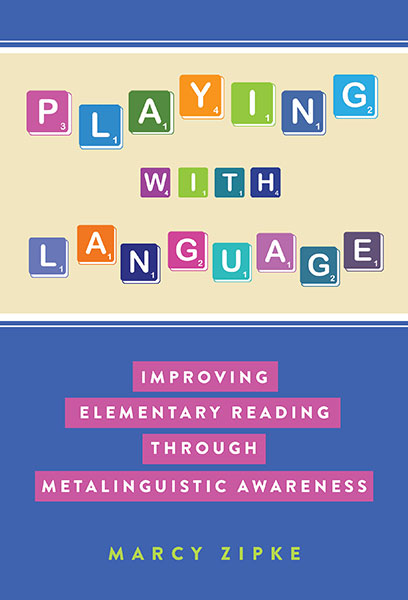Professors: Request an Exam Copy
Print copies available for US orders only. For orders outside the US, see our international distributors.
Publication Date: March 12, 2021
Pages: 144
Series: Language and Literacy Series

All students can benefit from a deeper understanding of how our language works. Playing With Language shows elementary school educators (K–6) how to think about, talk about, and manipulate language out of context. This cognitive skill set, known as metalinguistic awareness, is an important component of reading ability. This practical guide scales activities and teaching suggestions to students’ age, linguistic background, and individual strengths and challenges. The authors offer suggestions for introducing metalinguistic concepts like phonological, semantic, and syntactic awareness with fun activities like games, songs, rhymes, and riddles. The book also identifies and explains research that supports using metalinguistic teaching with diverse students and English learners to build skills in multiple areas, including reading comprehension and decoding ability. Teachers will find that students introduced to language play become continually engaged with language, finding real-world examples with wonder and delight.
Book Features:
Marcy Zipke is a professor in the Elementary and Special Education Department at Providence College. She has served as department chair and faculty senate representative and is currently coeditor-in-chief of the Journal of Research in Childhood Education.
“Attention to children’s language in schools can no longer be an afterthought for teachers. Zipke’s book reminds us that language can be an object of play, mystery, and wonder and a powerful means to support readers to be critical and thoughtful, not only in early childhood but throughout elementary school.”
—Teachers College Record
“Marcy Zipke has provided a highly valuable resource for teachers, researchers, and other students of literacy. Her book entails a comprehensive review and analysis of metalinguistic awareness and its contribution to reading and writing acquisition. She illustrates how language is structured on several levels, the value of providing students with insight about these structures, and ways to teach students that are engaging and activate their curiosity about their language. She shows how digging beneath the surface of speech can be fascinating and lead students to become word detectives. Students from preschool through adulthood and English language learners are considered. She grounds her work in science by reporting research that supports and amplifies her discussion. Highlights include the use of jokes, riddles, and ambiguous sentences to teach about language structure. Readers will enjoy and learn from this book, and teachers will gain new ideas to supplement their language arts instruction.”
—Linnea C. Ehri, distinguished professor emerita of educational psychology, Graduate Center, the City University of New York; past President, Society for the Scientific Study of Reading
“The major strength of this excellent book is that it provides a comprehensive and insightful analysis of how all forms of metalinguistic awareness, not just phonemic awareness, contribute to learning to read, including both decoding and comprehension skills. The detailed descriptions of classroom activities designed to promote the development of metalinguistic abilities, as well as procedures for assessing their growth, make this book a valuable resource for reading and language arts teachers in the elementary school grades. I highly recommend it.”
—William E. Tunmer, distinguished professor emeritus, Massey University, New Zealand
Contents
Introduction: Playing With Language 1
What You Will Find in This Book 4
Riddles and Wordplay 4
Outline by Chapter 7
Acknowledgments 8
1. Phonemic Awareness: Listening to Sounds in Words 9
Development of Phonemic Awareness 11
Instructional Recommendations 15
2. Set for Variability: Acquiring a Mindset of Flexibility 20
What Is Set for Variability? 20
What the Research Shows 22
Instructional Recommendations 26
3. Orthographic Awareness: Using Patterns to Encode and Decode 28
Development of Orthographic Awareness 30
Instructional Recommendations 32
4. Semantic Awareness: Focus on Homonyms 34
Homonyms 34
Riddles and Semantic Awareness 37
Instructional Recommendations 39
5. Syntactic Awareness: Focus on Multi-Meaning Phrases and Sentences 45
Development of Syntactic Awareness 47
Language Disorders and Syntax 49
Instructional Recommendations 51
Syntactic Riddles 52
6. Morphological Awareness: Word Parts With Meaning 56
Development of Morphological Awareness 58
Instructional Recommendations 62
7. Pragmatic Awareness: Choose Your Words Carefully! 66
Development of Pragmatic Awareness 68
Instructional Recommendations 70
8. Metalinguistic Awareness and Reading Comprehension: Putting It All Together 73
Models of the Reading Process 74
Instructional Recommendations 77
9. Assessment of Metalinguistic Awareness 81
Phonemic Awareness 82
Set for Variability 84
Orthographic Awareness 84
Semantic Awareness 85
Syntactic Awareness 87
Morphological Awareness 87
Pragmatic Awareness 88
Riddle Recalling and Retelling 88
Conclusion: Why Metalinguistic Awareness Is Important 90
What Does Metalinguistic Awareness Sound Like? 91
English Language Learners and Metalinguistic Awareness 93
Conclusion 93
Appendix A: Glossary of Terms 95
Appendix B: Digital Resources 97
Appendix C: Children’s Books That
Incorporate Language Play 103
Picture Books 103
Chapter Books 106
Riddle Books 107
References 109
Index 123
About the Author 133
Professors: Request an Exam Copy
Print copies available for US orders only. For orders outside the US, see our international distributors.